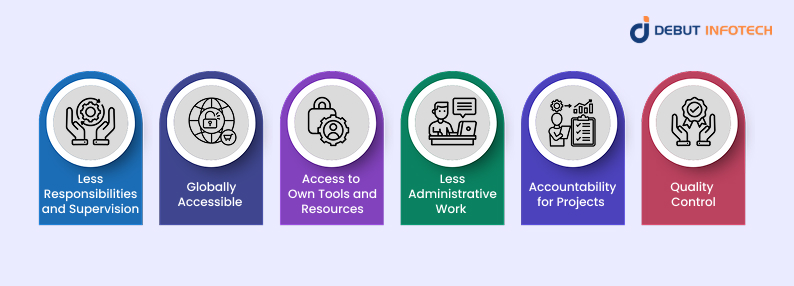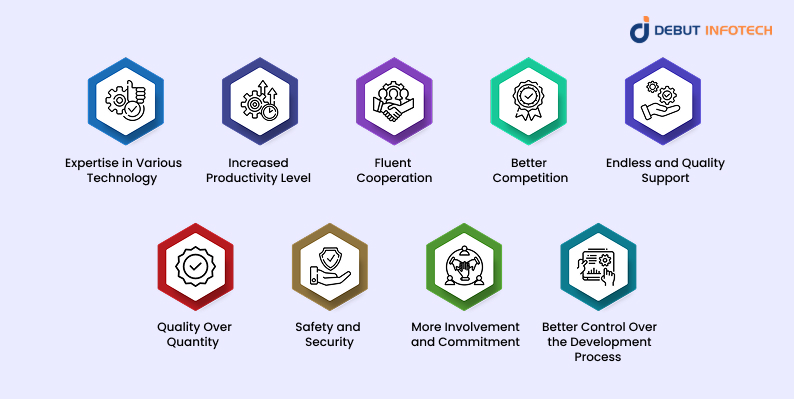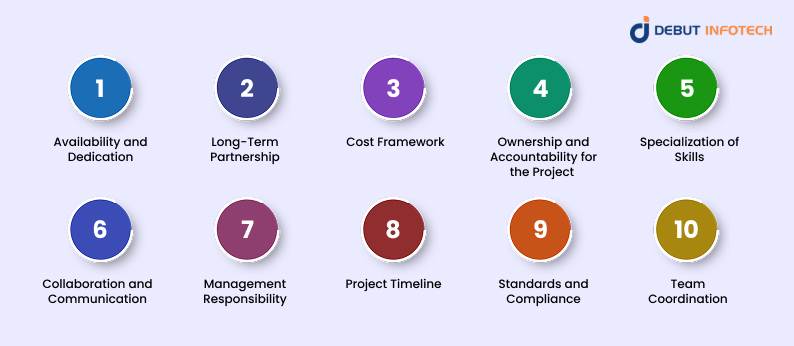Table of Contents
Home / Blog / Web Development
A Dedicated Team vs Freelance Developer: Which is Right for You?
March 28, 2025

March 28, 2025
Choosing between a dedicated team vs freelance developer is a crucial decision that determines the efficiency, cost, and ultimate success of your project. Both have their own unique benefits based on project complexity, budget, and timeline. With a dedicated team, you get structured collaboration, long-term commitment, and comprehensive expertise. At the same time, with freelancers, you benefit from flexibility and cost-effectiveness for smaller tasks.
A 2023 study by Upwork notes that 64 million Americans freelanced in 2023, reflecting a growing need for independent professionals. Also, according to a Statista report, the global IT outsourcing market, including dedicated development teams, will generate a revenue of $591.24bn in 2025, indicating the growing interest for structured, long-term development solutions. However, to make the best decision, you must know the strengths and weaknesses of the different approaches.
In this guide, we will cover the differences between a dedicated team vs freelance developer, their benefits, and key considerations to help you determine the best fit for your project needs.
Your project deserves real commitment
Freelancers come and go, but a dedicated team gives you stability, focus, and top-notch work. Let’s build together!
What is a Dedicated Development Team?
A dedicated development team is a team of experts that works exclusively on a project for a long time. This team usually consists of developers, designers, testers, and project managers who collaborate to create high-quality software solutions.
In contrast to freelancers, dedicated teams operate under structured workflows, ensuring seamless collaboration, transparency, and efficiency. Companies often hire dedicated teams when they require a consistent workforce with deep technical expertise to handle complex or long-term projects.
What is a Freelance Developer?
A freelance developer is an independent professional who offers development services on a project basis. Freelancers tend to take on short-term contracts and typically do remote work with no affiliation to one employer. They offer adaptability and affordability to companies requiring expertise for certain projects. Freelancers also usually set their own schedules, decide what tools to use, and determine where they want to work. This makes them a cost-effective way for companies to complete projects without needing long-term hires.
Benefits of Hiring Freelance Developers

1. Less Responsibilities and Supervision
Freelancers work independently, reducing the need for extensive supervision. They manage their own schedules and tasks, allowing businesses to focus on core operations rather than day-to-day project management. This makes them suitable for smaller projects that do not require constant oversight.
2. Globally Accessible
One of the biggest advantages of hiring freelance developers is their global availability. Businesses can tap into a diverse talent pool from different time zones and regions, ensuring access to specialized skills that might not be available locally. This can also result in competitive pricing and diverse perspectives in development.
3. Access to Own Tools and Resources
Freelancers usually bring their own tools, software, and infrastructure, reducing costs for the hiring company. Since they operate independently, businesses don’t have to invest in additional licenses, workstations, or equipment, making them a budget-friendly option.
4. Less Administrative Work
Hiring freelancers eliminates the need for complex administrative processes such as onboarding, payroll management, and employee benefits. Payments are typically handled per project or hourly, streamlining the hiring process.
5. Accountability for Projects
Freelancers take full responsibility for their assigned tasks. Since their reputation and future work depend on delivering high-quality results, they are often self-motivated to meet deadlines and project expectations. However, their level of commitment may vary depending on their workload and availability.
6. Quality Control
While freelancers offer flexibility, quality control can be a challenge. Businesses must establish clear guidelines, testing procedures, and feedback mechanisms to ensure the final product meets expectations. Conducting thorough vetting and setting performance benchmarks can help maintain high standards.
Benefits of Hiring Dedicated Developers

1. Expertise in Various Technology
Dedicated teams consist of experienced professionals with expertise in multiple technologies, frameworks, and programming languages. They are well-equipped to handle complex development challenges, ensuring efficient problem-solving and high-quality software solutions.
2. Increased Productivity Level
Since dedicated teams work exclusively on a project, they achieve higher productivity levels compared to freelancers juggling multiple clients. Their focus leads to faster development cycles and better project outcomes.
3. Fluent Cooperation
Collaboration is seamless in a dedicated team, as members work within a structured environment with defined roles and responsibilities. This ensures efficient communication, reduces misunderstandings, and enhances teamwork.
4. Better Competition
A dedicated team can help businesses stay ahead of competitors by delivering innovative, high-performance solutions. Their ability to adapt to market changes and technological advancements gives companies a strategic advantage.
5. Endless and Quality Support
Unlike freelancers, dedicated teams provide continuous support and maintenance, ensuring that applications remain functional, secure, and up-to-date. This is especially crucial for businesses that require long-term technical assistance.
6. Quality Over Quantity
Dedicated teams focus on delivering high-quality solutions rather than just completing tasks quickly. They follow rigorous testing and quality assurance processes to ensure the final product meets industry standards.
7. Safety and Security
With a dedicated team, businesses can enforce strict security protocols, protecting sensitive data, intellectual property, and project details. Dedicated teams adhere to NDAs, compliance standards, and secure development practices.
8. More Involvement and Commitment
Since dedicated teams are deeply involved in a project, they align their goals with the company’s vision. This level of commitment leads to better strategic planning, collaboration, and product success.
9. Better Control Over the Development Process
Businesses have greater control over project timelines, workflows, and deliverables when working with dedicated teams. Project managers ensure that milestones are met and changes can be implemented efficiently.
Dedicated Development Team vs Freelancers: Which is the Better Option?
Choosing between a dedicated team vs freelance developer depends on multiple factors. Freelancers are suitable for short-term projects, while dedicated teams excel in long-term, complex development needs.
Businesses must assess their requirements, budget, and technical expectations before deciding.
Here are some factors to consider when choosing between a dedicated team vs freelance developer:
1. Project Complexity and Scope
For projects with extensive features, integrations, and long-term support, a dedicated team is the ideal choice. They provide structured workflows, consistent collaboration, and expertise needed for complex software development.
Freelancers, while skilled, are better suited for smaller, well-defined tasks that don’t require ongoing maintenance, cross-functional teamwork, or large-scale project management.
2. Budget Considerations
Freelancers offer lower upfront costs, making them suitable for startups or businesses with tight budgets.
However, a dedicated team ensures long-term value by reducing the risk of delays, technical debt, and inconsistent quality. While hiring a team may require a higher initial investment, it leads to better project execution, long-term savings, and reduced need for rework or additional —factors that significantly impact web application development cost.
3. Timelines
Freelancers work flexible hours, but their availability varies based on multiple commitments. This can lead to delays if they juggle several projects. Dedicated teams operate on fixed schedules, ensuring consistent progress and faster completion. If meeting deadlines is critical, a dedicated team provides better reliability. At the same time, freelancers may be a better fit for less time-sensitive tasks.
4. Quality and Level of Technical Expertise Required
A dedicated team offers diverse skill sets and follows standardized development practices, ensuring high-quality results. They specialize in various technologies, frameworks, and methodologies, which is essential for complex projects requiring advanced problem-solving. Freelancers, though knowledgeable, may have limited expertise in niche areas and may not provide the same level of structured quality assurance.
5. Flexibility and Scalability
Freelancers offer greater flexibility, making them ideal for short-term, specialized tasks. However, scaling a project with multiple freelancers can become challenging due to inconsistent workflows and communication gaps. Dedicated teams allow for seamless scalability, adapting to evolving project needs with additional resources, structured coordination, and well-defined processes that ensure long-term growth.
6. Prior Industry Knowledge
Industry experience plays a vital role in software development success. Dedicated teams bring sector-specific insights, regulatory compliance expertise, and a deep understanding of industry challenges. This enhances innovation and strategic decision-making.
For instance, partnering with experienced web development companies ensures access to specialized knowledge, streamlined processes, and tailored solutions that meet industry requirements.
Freelancers may possess technical skills but lack industry-specific exposure, requiring additional onboarding and research to align with business goals and compliance standards.
When You Should Hire a Dedicated Team?
Here are three major reasons why you should hire a dedicated team:
1. New Entry into the Market
A dedicated team helps new businesses build a strong foundation, ensuring structured development, market research, and strategic planning. They provide expert guidance on technology selection, scalability, and compliance. Unlike freelancers, a dedicated team ensures long-term support, helping startups establish a competitive edge in the industry.
2. Discovery or Decision Stage
During the discovery phase, businesses require market analysis, feasibility studies, and technical validation. A dedicated team provides comprehensive insights, helping refine ideas, define requirements, and build prototypes. Their expertise ensures well-informed decisions, reducing risks and costly revisions—something freelancers may lack due to limited involvement in strategic planning.
3. Long-Term Project
For projects requiring continuous updates, maintenance, and scalability, a dedicated team ensures consistent development, structured workflows, and seamless collaboration. They integrate with business objectives, providing reliable long-term support. Freelancers, often working on short-term tasks, may not be available for future enhancements, leading to disruptions and management challenges.
Comparison of Dedicated Team vs Freelance Developers

To make the best decision, businesses must compare dedicated team and freelance developer.
Here is a detailed comparison between a dedicated team vs freelance developer:
1. Availability and Dedication
A dedicated team works exclusively on your project, ensuring consistent progress, faster iterations, and a structured development process. They follow a fixed schedule and provide ongoing support.
On the other hand, freelancers often handle multiple projects at once, which may lead to delays, reduced focus, and inconsistent availability. If project continuity and reliability are priorities, a dedicated team offers greater commitment and long-term stability.
2. Long-Term Partnership
A dedicated development team fosters long-term collaboration, allowing for continuous product improvements, strategic planning, and ongoing support. They become deeply familiar with your business goals, ensuring seamless enhancements and adaptability.
While useful for short-term needs, freelance developers may not be available for future updates or maintenance, requiring you to onboard new developers frequently, which can impact efficiency and consistency.
3. Cost Framework
Freelancers typically charge hourly or per project, offering a cost-effective solution for small tasks. However, costs can accumulate if multiple freelancers are required. A dedicated team follows a structured pricing model, which may seem higher upfront but offers long-term financial benefits by reducing rework, ensuring efficiency, and maintaining consistent quality. For complex, ongoing custom software development projects, a dedicated team provides better cost efficiency and predictability.
4. Ownership and Accountability for the Project
A dedicated team takes full responsibility for the project, ensuring structured workflows, accountability, and long-term support. They work within defined methodologies to maintain high standards and efficient project execution.
A freelance web developer, though accountable for their individual tasks, may lack a comprehensive view of the project, leading to misalignment, communication gaps, and a lack of collective responsibility for the overall success of the development.
5. Specialization of Skills
Dedicated teams include a range of experts, such as developers, designers, QA testers, and project managers, ensuring well-rounded expertise for complex projects. They keep up with emerging trends, best practices, and industry standards. Freelancers, while highly skilled, typically specialize in specific areas. This means multiple freelancers may be required for comprehensive development needs, leading to coordination challenges.
6. Collaboration and Communication
A dedicated team follows structured communication protocols, using project management tools, regular meetings, and agile workflows to ensure seamless collaboration. They integrate directly into your company’s workflow, reducing miscommunication.
Freelancers, who work independently, may lack synchronized collaboration, leading to delayed responses, inconsistent updates, and difficulties in coordinating tasks, especially when multiple freelancers are involved in one project.
7. Management Responsibility
With a dedicated software development team, project management is streamlined through established leadership roles, such as project managers and tech leads, ensuring efficient coordination and accountability. Freelancers require individual oversight, meaning clients must manage timelines, deliverables, and task delegation themselves. This adds extra workload and may lead to challenges in aligning multiple freelancers to ensure consistent progress and quality control.
8. Project Timeline
Dedicated teams follow structured workflows, sprint cycles, and defined roadmaps, ensuring timely delivery. They work on predefined schedules, minimizing delays. Freelancers, though flexible, may have conflicting commitments, leading to unpredictable timelines. If meeting strict deadlines is a priority, a dedicated team provides better reliability.
Freelancers are best suited for short-term tasks that allow for flexible scheduling without impacting the overall project timeline.
9. Standards and Compliance
Dedicated teams adhere to industry best practices, security protocols, and compliance regulations, ensuring the final product meets legal, technical, and ethical standards. They conduct regular audits, testing, and quality assurance to prevent compliance risks. Freelancers may not always follow standardized security and regulatory requirements, requiring additional oversight and verification to ensure full adherence to industry standards.
10. Team Coordination
When you hire dedicated remote developers, they work as a cohesive unit, ensuring effective coordination, alignment of goals, and smooth execution. They operate under established workflows with clearly defined roles and responsibilities. Freelancers, while skilled, often work in isolation, making it difficult to achieve seamless collaboration. If multiple freelancers are hired for different tasks, coordinating their work efficiently can be challenging, leading to misalignment and inefficiencies.
No more last-minute panic
Dedicated developers keep your project moving without the usual delays or drop-offs. Ready to build something solid?
Conclusion
The choice between a dedicated team vs freelance developer mainly relies on your business goals, project complexity, and budget. Freelancers work best for fast, cost-effective solutions, whereas dedicated teams offer long-term value, security, and know-how.
Businesses must weigh their options carefully to choose the best fit for their needs.
FAQs
Dedicated developers bring stability, long-term commitment, and better collaboration to your project. Unlike freelancers, they work as part of your team, ensuring reliability, consistency, and deeper involvement in your goals—no juggling multiple clients, no sudden disappearances, just focused development.
A freelancer works independently, juggling multiple projects, while a developer can be part of a dedicated team or company. Freelancers offer flexibility, but dedicated developers provide stability, long-term support, and better collaboration, making them a stronger choice for complex or ongoing projects.
Absolutely. Companies need skilled developers, and freelancers offer flexibility and cost savings. Businesses often hire them for short-term projects or specialized tasks. However, for long-term projects or deep collaboration, dedicated developers are usually the smarter investment.
Look for experience, technical skills, and a proven track record. Check their past projects, client reviews, and communication style. A great team understands your vision, works collaboratively, and delivers quality code—without the headaches of misalignment or constant follow-ups.
Dedicated developers integrate with your team, ensuring long-term reliability, faster development, and a deeper understanding of your project. Unlike freelancers, they prioritize your goals, making them the better choice for businesses needing consistent, high-quality development without constant onboarding.
Talk With Our Expert
Our Latest Insights
USA
2102 Linden LN, Palatine, IL 60067
+1-703-537-5009
[email protected]
UK
Debut Infotech Pvt Ltd
7 Pound Close, Yarnton, Oxfordshire, OX51QG
+44-770-304-0079
[email protected]
Canada
Debut Infotech Pvt Ltd
326 Parkvale Drive, Kitchener, ON N2R1Y7
+1-703-537-5009
[email protected]
INDIA
Debut Infotech Pvt Ltd
C-204, Ground floor, Industrial Area Phase 8B, Mohali, PB 160055
9888402396
[email protected]




Leave a Comment